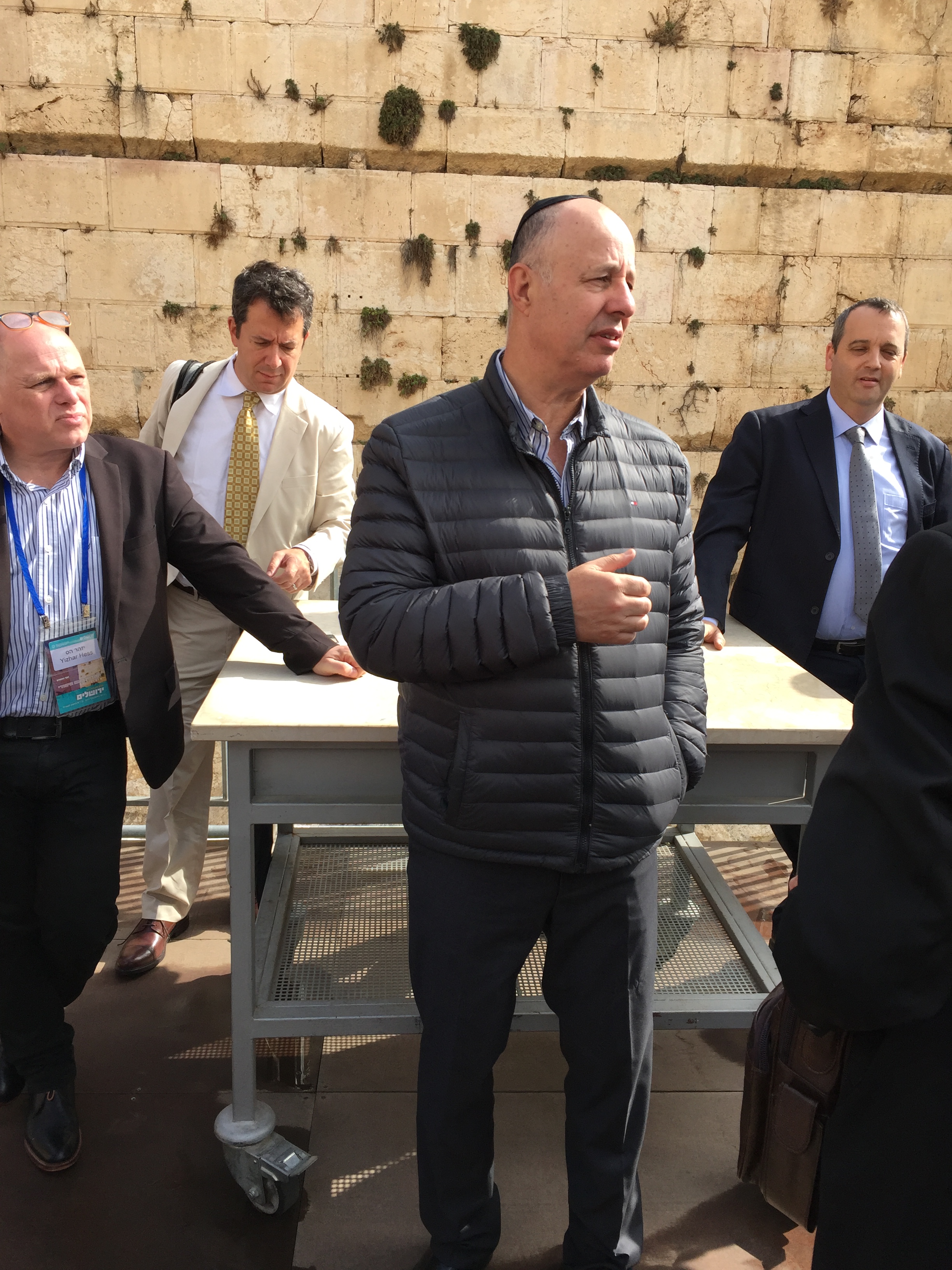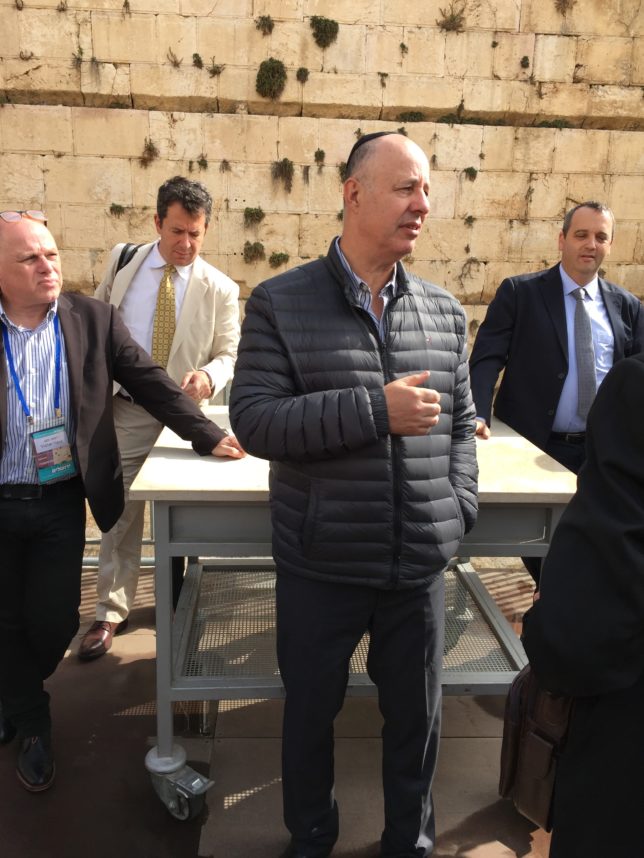

Tzachi Hanegi. Rabbi Gilad Kariv, Executive Director of the Israel Movement for Progressive Judaism is behind Hanegbi and to his left. My photo.
I just returned from meetings of the Board of Governors of the Jewish Agency for Israel (BOG of JAFI) and the Zionist Council of the World Zionist Organization (Vaad HaPoel of the WZO) that met this past week in Jerusalem. (see notes below about these two national institutions of the Jewish people).
Two items were prominent on the agenda of JAFI – The Kotel Agreement compromise reached by the government of Israel in January 2016 (19 months ago) and the Conversion Law introduced before the Knesset by the ultra-Orthodox religious parties.
Re: the Kotel Agreement compromise – This agreement was reached after nearly four years of negotiations. If implemented the agreement would create an egalitarian prayer space in the southern Kotel plaza that would be equal in size and accessibility with the traditional Kotel plaza. Whereas the traditional Kotel plaza would continue to be controlled and supervised by the chief rabbinate of the Wall, the new southern Kotel plaza would be controlled and supervised by the Reform and Conservative movements, the Jewish Federations of North America, and the Women of the Wall. There would be a common entrance and both the traditional and southern plazas would be visible from that entrance. The new southern Kotel plaza would be characterized by egalitarian mixed gender prayer.
Prime Minister Netanyahu had asked Natan Sharansky in 2013 to find a compromise agreement that would eliminate the tensions that had developed as a consequence of the monthly prayer minyans observed by Women of the Wall in the back of the women’s section for the last 25 years, and would address the concerns of many Israelis that the entire Kotel plaza had been turned into an ultra-Orthodox synagogue. Non religious ceremonies had once been conducted in the plaza by the State of Israel including induction into the IDF, among others. Whereas the plaza represented the modern State of Israel as a national heritage site, it had been taken over by the most extreme religious forces in the state.
Natan Sharansky and the committee representing all interested parties including the chief administrator of the Wall succeeded in reaching a compromise. Should the agreement then be implemented as intended, it would have marked a victory for religious pluralism and democracy.
However, on June 25, 2017, the Prime Minister abandoned the agreement when the ultra-Orthodox religious parties in his ruling government coalition threatened to leave the government should the compromise agreement be implemented. This action infuriated Natan Sharansky, the Board of Governors of the Jewish Agency for Israel that Sharansky now chaired, and the leadership of non-Orthodox Jews in Israel and throughout the Diapsora.
Also on June 25, 2017, the ultra-Orthodox parties submitted a bill to the Knesset that would restrict authority over all conversions in Israel to the ultra-Orthodox Chief Rabbinate. This means that 350,000 Israeli citizens who are not Jewish according to traditional halachah (“Jewish law”) must convert according to the most rigid and strict standards as determined by the Israeli Chief Rabbinate. The 350,000 Israelis are primarily immigrants or children of immigrants from the former Soviet Union who either do not have a Jewish mother or who are spouses and family of Jews who would like to to convert to Judaism but who would prefer to study with Reform or Conservative Rabbis and to live their Jewish lives according to Reform and/or Conservative standards, or as a vast majority of Israelis practice but are not Orthodox.
These non-Jewish Israelis, by the way, serve in the Israeli Defense Forces, speak Hebrew, pay Israeli taxes, and in every way identify as Israeli citizens. But, they cannot marry in Israel unless they convert to Judaism. The Conversion Bill would make it far more difficult for them to ever convert. The ultra-Orthodox rabbinate converts only a few hundred individuals each year.
The Conversion Bill also rejects for purposes of Aliyah under the Law of Return any Jew converted in Diaspora communities by rabbis not approved by the Chief Rabbinate. This means that no Reform and Conservative rabbis, no modern orthodox rabbis, and even many Haredi rabbis are not approved by the chief rabbinate as authentically Jewish.
The Kotel Agreement and the Conversion Law dominated our meetings of the Board of Governors of the Jewish Agency this past week.
In response to the outrage of the members of JAFI, Prime Minister Netanyahu asked his close political and personal ally, Minister of Regional Cooperation Tzachi Hanegbi, to meet with us and explain the government’s position. The American Reform movement led by Rabbi Rick Jacobs, the Israeli Reform movement led by Rabbi Gilad Kariv, and the American Conservative movement led by Rabbi Steven Wernick expressed to Hanegbi emphatically our demand that the original Kotel agreement be implemented and that the Conversion Law be withdrawn from consideration permanetly. Netanyahu had tabled the Conversion Law for six months and it will be reconsidered at the end of December.
In the very week when we celebrated the hundredth anniversary of the signing of the Balfour Declaration (November 2, 1917) in which the British government declared its support for the establishment of a national home for the Jewish people in the land of Israel, it was shocking to confront the reactionary response of the Netanyahu government concerning the Kotel and conversion. These issues in and of themselves are important, but they are only the tip of the iceberg. The real issue at stake is whether Israel will remain religiously pluralistic and democratic.
By his actions, the Prime Minister created a serious rift between the government of the State of Israel and the Jewish Diaspora, so much so that for the first time in history an Israeli Prime Minister was not invited to address the Jewish Agency Board of Governors. For the first time in my memory as well, the Prime Minister will not attend nor address by video the General Assembly (GA) of Jewish Federations, the most important American Jewish body, taking place next week in Los Angeles.
We of the Board of Governors of the Jewish Agency convened at the Kotel last week in a demonstration of our support for the original Kotel agreement. It is important to note that there are those in the JAFI BOG leadership who would take whatever we can get from the government now and continue to fight for the implementation of the rest of the original compromise agreement. There are others including our Reform movement leadership who argue that the negotiated agreement reached in June, 2016 is already a compromise and should be implemented without changes.
At the Kotel, after Minister Hanegbi tried to reassure us of the Prime Minister’s good intentions, I asked an obvious question:
“It seems to much of world Jewry that Prime Minister Netanyahu is more concerned with holding his position as Prime Minister and keeping his governing coalition together than he is concerned with the best interests of klal Yisrael, the entirety of the Jewish people. How do you respond to this widely held belief?”
Minister Hanegbi said that this was not true, that the Prime Minister has political challenges to consider and that he still believes that a compromise is achievable.
No one I know standing there at the holiest site in Judaism believed that Netanyahu would become a “profile of courage” and risk his government on this issueor, for that matter, on any issue.
What is the take-away for us?
First, it is our duty as Diaspora Jews to continue to support the State of Israel as the national home of the entire Jewish people.
And second, it is our obligation to align ourselves with progressive democratic forces in Israel that advocate for religious pluralism, democracy, and human rights.
The following day, the 120 members of the Jewish Agency Board of Governors went to the Knesset and met individually in groups of four with thirty-four MKs. Our message was simple – ‘implement the original Kotel Agreement and reject the Conversion Law.’
After our individual hour-long discussions, we met in a large Knesset Conference room and many MKs spoke to us including members of the ruling coalition Likud, the Zionist Union, Kulanu, Yesh Atid, Bayit Hayehudi, and others. To a person, each supported our agenda and said so forthrightly. We did not meet, however, with any members of the extremist ultra-Orthodox parties or the Arab List.
Notes:
JAFI and the WZO are two of the three national institutions of the Jewish people. The third is Keren Kayemet L’Yisrael (i.e. KK’L – or JNF).
Theodor Herzl, the Father of Zionism, founded the WZO in 1897 in Basel, Switzerland. It is called “the Parliament of the Jewish people” and includes representatives from every major Israeli political party and all world Zionist organizations.
David Ben Gurion founded the Jewish Agency for Israel in 1935 and served as its first Chair. He was also the chair of the WZO before the state was founded. Today, Natan Sharansky serves as chairman of the Jewish Agency Executive.
JAFI’s purpose is to “inspire Jews throughout the world to connect with their people, heritage, and land, and empower them to build a thriving Jewish future and a strong Israel.”
The WZO’s purpose “… aims at establishing for the Jewish people a legally assured home in Palestine.” Today, the WZO includes the World Zionist Unions, international Zionist federations; and international organizations that define themselves as Zionist, such as WIZO, Hadassah, B’nai Brith, Maccabi, the International Sephardic Federation, the three religious streams of world Judaism (Orthodox, Conservative, Reform), a delegation from the Commonwealth of Independent States (i.e. the former Soviet Union), the World Union of Jewish Students (WUJS), and more.
Both national institutions bring the State of Israel and the Jewish Diaspora together to debate the great issues facing the Jewish people, to promote the Jewish people’s general welfare, and to fund programs and projects that support world Zionism and the connections of world Jewry to the State of Israel.






















 More news and opinions than at a Shabbat dinner, right in your inbox.
More news and opinions than at a Shabbat dinner, right in your inbox.